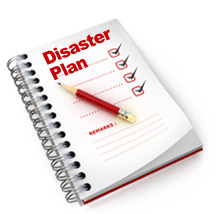 Your home or work routines can be disrupted with little or no warning by natural disasters, fires or other catastrophic events. Its important that you and your family are prepared as help may not always be available. During large community wide emergencies, first responders – police, fire and emergency medical services may be overwhelmed with numerous calls for help or even physically unable to reach your location due to blocked roads. Make a plan and share this information with your loved ones to prevent needless confusion and worry.
Your home or work routines can be disrupted with little or no warning by natural disasters, fires or other catastrophic events. Its important that you and your family are prepared as help may not always be available. During large community wide emergencies, first responders – police, fire and emergency medical services may be overwhelmed with numerous calls for help or even physically unable to reach your location due to blocked roads. Make a plan and share this information with your loved ones to prevent needless confusion and worry.
- Determine the safest course of action for you and your family for each hazard. In some situations, it may be better to stay where you are, also called sheltering in place. This would be necessary during a tornado or hazardous chemical release, for example. Sometimes, leaving an area to escape danger or evacuation is the safer course of action in situations such as a fire or hurricane.
- Stay informed. Know how your community alerts citizens in an emergency. It may be an emergency broadcast on the radio or TV. You might hear a special siren, or get a telephone call, or emergency workers may go door-to-door. If available, sign up for your communitys emergency text or email alert system.
- Plan for your family’s comfort during disasters. Severe weather, earthquakes, flooding and other emergencies may cause utility outages.
- Prepare a kit that can meet your household’s basic needs food, water, etc. for 72 hours. Dont forget a kit for your car.
- Practice with your family what to do in an emergency. Conduct regular drills for the most common hazards such as a fire, tornado or earthquake.
- Know how to keep in touch. Local telephone service may be interrupted. Sometimes, it is easier to send a text message or contact a family member in another state. Each family member should know how to make contact to advise that they are safe.
